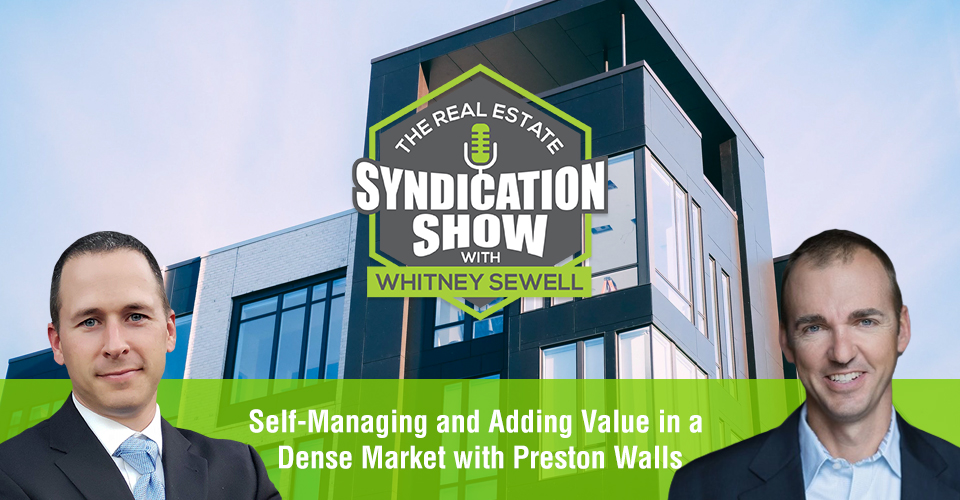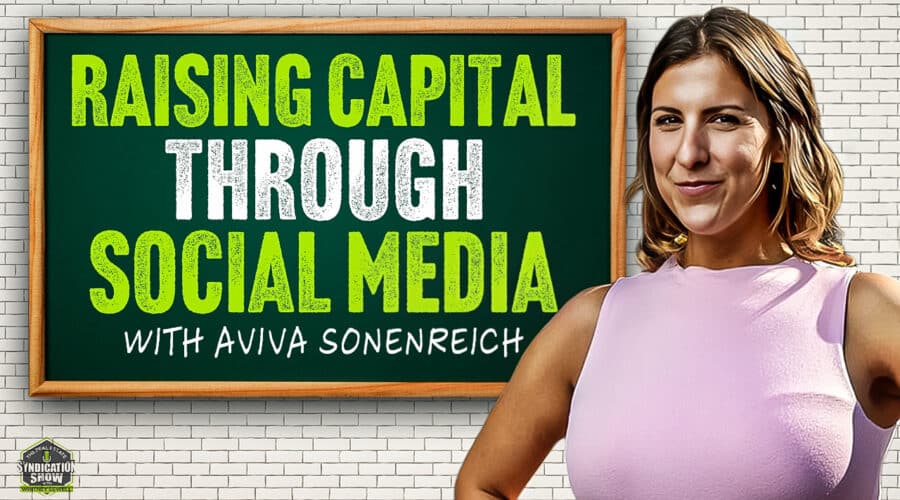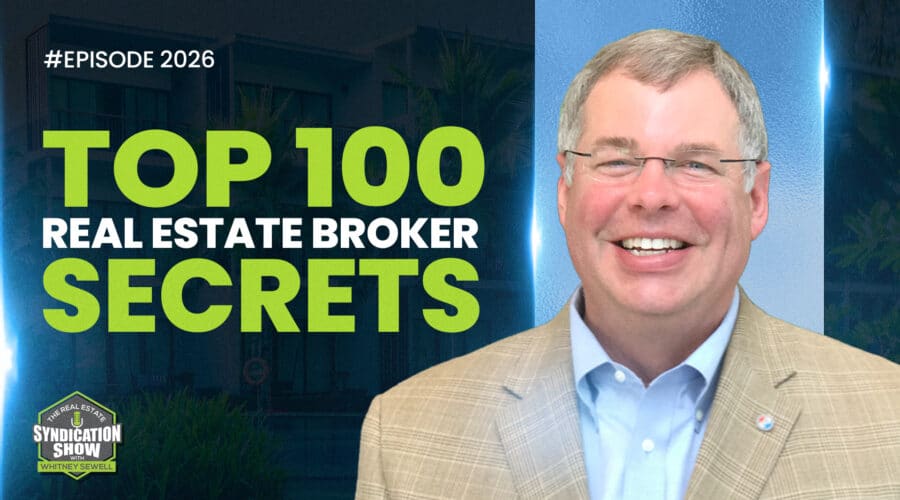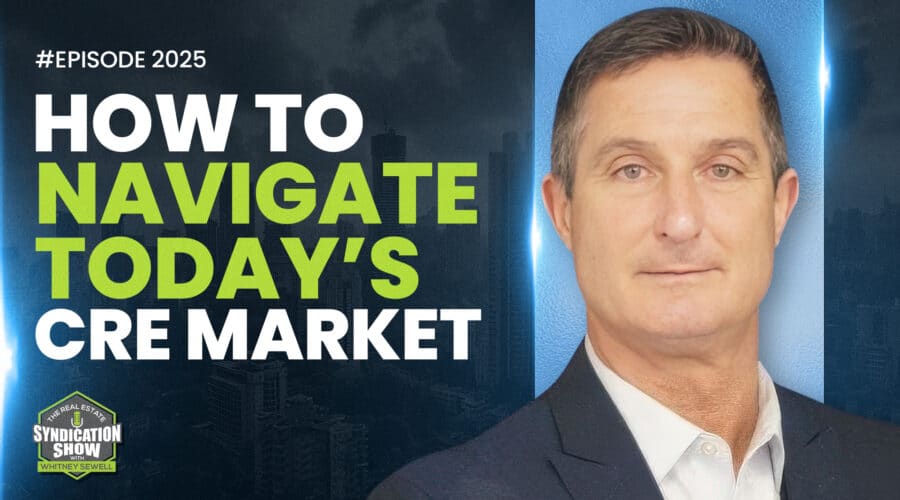We would like to extend a warm welcome to Preston Walls, CEO of Walls Property Group, who is our guest for today’s show. Preston grew up in Seattle and learned the real estate game from his father who was a property developer. Once his dad retired in 2008, Preston went at it alone and now his portfolio consists of 70 multifamily buildings valued at over 300 million dollars! Preston talks to us today about why he loves self-managing multifamily properties in the Seattle market. He also shares some of his strategies for finding and adding value to deals in his town.
Our gracious sponsor:
Lionshare Bookkeeping believes the key to generating wealth is understanding where it comes from, and where it needs to go. They provide bookkeeping and financial coaching exclusively to Real Estate Investors – focusing on cash flow, strategy, and action. Go to http://bit.ly/LionshareBookkeeping to connect with them now.
Watch the episode here:
Listen to the podcast here:
Preston has put his blood, sweat, and tears into learning his hometown market which has strict construction laws and is also highly dense. This makes it a tough space to work in but also one that presents high yields to those with an in-depth understanding of it. The creative strategies that he uses to add value to such a dense market are fascinating, as are some of his ideas about being fully vertically integrated. While most owners/syndicators prefer to outsource management to third party companies, Preston loves doing it with his teams. He gets into the many benefits that he sees in using this method. After explaining why multifamily keeps him from worrying about the downturn, Preston shares a community project that hasn’t been spoken about on this show before, so be sure tune in for this one!
Key Points From This Episode:
- Preston’s journey learning real estate in Seattle from his developer father.
- The strategies Preston used to get to owning 300 million dollars in multifamily apartments.
- Preston uses densification techniques to create affordability in the Seattle market.
- Why Prestons stays in the Seattle market: its impenetrability and rent growth rates.
- The benefits of staying in one market: exploiting detailed knowledge about it.
- Preston’s strategy for finding his buildings: listed properties and broker relations.
- The terms Preston offers: all cash, 45-60 day closes, and more.
- How goodwill plays into Preston winning deals from brokers.
- Various ways Preston buys property, such as syndicating and in his own capacity.
- The ideal property Preston looks for: five to 50-unit value-add apartments.
- Different teams Preston works with, such as management and operations teams.
- The benefits of vertically integrating as far as insight and lease-ups go.
- How Preston got into self-management through an organic process.
- Where Preston sees his business in five years.
- Ways that Preston has improved investor relations through hiring staff and a reporting portal.
- Preston uses monthly reports and Instagram pages to regulate investor communication.
- The hardest part about syndication for Preston: investor relations.
- When Preston will sell while otherwise holding properties.
- What makes holding a good choice in Seattle: construction permit laws.
- How investors make their money back from Preston through his refinancing strategies.
- Preston has used technology to improve his business: digitization, Instagram, and more.
- Diverse assets and the multifamily game keeps Preston from worrying about the downturn.
- How Preston cares for investors and what has made him successful.
- The essay competition that Preston hosts to give back to the community.
[bctt tweet=”The Seattle market is dense and it’s growing, and like many markets, affordability is a challenging topic so one way that we’ve been able to address and create affordability is by creating more dense spaces. — Preston Walls” username=”whitney_sewell”]
Links Mentioned in Today’s Episode:
About Preston Walls
In his executive career, Preston has held leadership positions at Walls Property Group as Founder and CEO for over 7 years, and almost that long as founder and CEO at Walls Property Management. He is currently managing a portfolio of 70 buildings valued at over $300 million. Preston directed a ground-up, 42-unit Built Green Class A Mixed-Use project, including planning, permitting, tenant relocation, demolition, construction, leasing, and financing. He is currently building a 61-unit mid-rise multifamily project, in permit for a 59-unit site, and renovating several existing value-add properties in Seattle. Preston has managed syndication projects requiring additional equity capital and raising capital, negotiating terms and partnership agreements, partitioning risk, and managing equity and debt offerings to investors. He has also served as the project manager for dozens of building renovations. Preston obtained a B.A. with a double major in Economics and English from Colgate University. He has served on boards and advisory councils, including Discovery Montessori and Lakeside School. In his free time, Preston can be found fishing, boating, wake surfing, skiing, and spending time with his two children. Preston also enjoys volunteering with his favorite charity, The Goodtimes Project – whose vision is to create caring spaces for families who have been affected by childhood cancer.
Full Transcript
[INTRODUCTION]
[00:00:00] ANNOUNCER: Welcome to The Real Estate Syndication Show. Whether you are a seasoned investor or building a new real estate business, this is the show for you. Whitney Sewell talks to top experts in the business. Our goal is to help you master real estate syndication.
And now your host, Whitney Sewell.
[INTERVIEW]
[0:00:24.1] WS: This is your daily Real Estate Syndication show. I’m your host Whitney Sewell. Today, our guest is Preston Walls. Thanks for being on the show Preston.
[0:00:33.2] PW: Thank you for having me Whitney, I’m excited for this.
[0:00:35.1] WS: Yeah, me too. Preston is the founder and CEO of Walls Property group. His portfolio consists of 70 multi-family buildings valued over 300 million dollars located in Seattle Washington. His investment model is geared towards long term passive income. Preston, thank you again for your time and generosity in being on the show. Give the listeners a little more about who you are and let’s dive in to a few strategies and a few things that you focused on that I know the listeners are going to benefit from.
[0:01:06.1] PW: You bet Whitney, thank you for having me and great job with your show, I love ether broad array of topics you cover on this. Great job with this. But yeah, Seattle is my market. It’s where I grew up. It’s what I know. My father’s a real estate developer in Seattle. I grew up going on service calls with him and traipsing around job sides and despite my best efforts to move away to college and live the man a few years after college.
He got me to move back to Seattle. We built a couple of buildings together and he retired in 2008 just as the economy was falling apart and been on my own since then.
[0:01:45.5] WS: Wow, okay. You know, one thing you and I were talking about and I want us to get into was you know, you’ve got a lot of buildings and valued over 300 million dollars. You’re not the smallest fish in the bowl there I would imagine. But all your properties are focused in Seattle and I’d love for us to talk about that a little bit, like your strategy behind that and some other things that have come from that.
[0:02:09.5] PW: Yeah, Seattle market, it’s dense, it’s growing and like many markets, affordability is a challenging topic so one way that we’ve been able to address and create affordability is by creating more dense spaces. So my value add model, I’m looking at buildings that have a large delta between gross net rentable square footage that I can either add new units into or reconfigure existing units to make them more livable for roommate situations. Things like turning dining rooms into bedrooms, adding bathrooms just to make the space more livable and to share rent more affordable for residents.
[0:02:53.2] WS: Wow, okay. Why not look in other markets? Why just strictly stay there?
[0:02:58.7] PW: Seattle has a fair number of barriers to entry, permitting for one, permitting is a long tedious drawn out process in Seattle. There are a lot of tenant protections in Seattle that may give challenging to do business and I’ve invested a lot of time and gain and knowledge, heartache of going through the process and getting to know it. The rent growth in Seattle has been tremendous. It’s always exceeded my forecasts and so the projects just continue to do better and better over time and that makes having that a long term time horizon really pay off.
[0:03:43.4] WS: What’s been some of the benefits Preston, you would say that you’ve seen from focusing on one market and just staying right there?
[0:03:52.0] PW: Yeah, it’s given me a lot of confidence in underwriting, being able to know the market really well and know the differences between not just neighborhoods but streets within neighborhoods, the premium or discount that’s associated with one side of a street versus another. I really enjoy and appreciate the granularity that comes with diving deep into a market and having the confidence going to a competitive offer situation where the number of offers on building and be able to have the right strategy and knowledge of what the property is going to become when done.
[0:04:28.0] WS: What has been your strategy for finding the multi-family buildings that you have now?
[0:04:33.2] PW: Probably half the properties are listed properties, they come through the MLS and then the other half I’ve been doing it long enough that the brokers know me, they know my strategy, they know that I’m going to close and they know roughly what terms I’m going to offer on, so I see a lot of off market deals that way.
[0:04:52.8] WS: Okay, what are those terms going to be, what do they know that this is what Preston’s going to offer?
[0:04:58.2] PW: They know it’s going to be an all cash offer, they know it’s going to have a short feasibility timeframe and some non refundable earnest money, and probably a 45 to 60-day close.
[0:05:10.7] WS: You’ve done it enough that they know you’re consistent, right?
[0:05:14.0] PW: Yes, a lot of deals that I win in competitive situations, even if I’m not the highest dollar number out there, they know that I’m going to close, they know that my offer is the security of execution and getting the deal done from our sellers, that there’s some value in that and that carries a premium and they’ll go with that.
[0:05:35.4] WS: Okay, now, are you syndicating all of these properties or is it some of both or is that all not syndicated.
[0:05:41.4] PW: I have a mix of properties. I buy properties on my own, I buy properties for my family, my kids own some properties and I syndicate a number of properties as well.
[0:05:53.1] WS: Okay, what’s the normal size of property you’re looking for?
[0:05:58.8] PW: My sweet spot is probably five to 50 units all within Seattle on the value add side and I’m getting a couple of projects that are in the 60-unit range but the value add, that’s yeah, 5 to 50 units as we were there.
[0:06:16.9] WS: Are you self-managing or are you going to do or hire your third party?
[0:06:20.0] PW: I’ve set up to be as vertically integrated as possible so yeah, I have a property management company, we handle the lease up on all the properties, we have a maintenance team, we have operations team, accounting, we also have construction management team that handles all the renovations on the value add repositioning. We deal with third party contractors on the ground up sites.
[0:06:43.4] WS: Is that – I ask this question often just because I like to hear different people’s opinions that have vertically integrated companies like yourself, and the experience level that you have, is that something you recommend other people do and, you know, as far as, you know, okay, managing their own property or starting their own management company?
[0:07:01.8] PW: You know, it’s interesting, you ask a thousand people you’ll get a thousand different answers on this and there’s value in both approaches. What has benefitted or how it’s benefitted me is having a leasing department, having an operations department, having a maintenance team, having a construction team, it gives me insight, what are construction costs doing, what are lease rates doing?
And I’m closer to it. I can go talk to the leasing team, see what traffic’s like rather than going through a third party management company. The other way that it benefits me, especially with lease up, those are challenging times and we need to push a little bit harder on a leasing team than standard turnover.
You’re willing to show the apartment a few more times than you would on a standard lease up because we need the higher rent to get the loan on it to take out your construction financing.
[0:07:58.0] WS: Okay. When in your – I guess career or in this path did you start your own management company? Did you have numerous units or is this something from the very beginning?
[0:08:09.3] PW: I’ve been self-managing from the beginning and it’s just something that evolved and grew into construction management than hiring third party contractors to do construction management and brought that in house and yeah, it’s just all grown organically.
[0:08:29.9] WS: Nice. Yeah, I hear both sides of that coin so being able to say, “No, I’m going to hire it out to the professionals and let them do it,” and other people say, “I’m going to be able to have a lot better handle on the cash flow and what’s happening on the day to day basis if we’re managing it in-house.” You know, I can definitely see both sides of it but I love hearing somebody that’s actually doing it and been doing this a long time, you know, just your opinion and it sounds like it’s worked really well for you.
What’s next, you know, how is your company growing, what’s happening, you know, where do you see it five years from now?
[0:09:02.0] PW: I see doing more frequency deals, larger deals, we’re building out our investor relations team. I mean, we started with friends and family money and that’s kind of grown to friends and family money but having a long term approach and ideals, going with no extra timeframes so I don’t have a sales timeframe in mind for the assets and it tends to gravitate towards family offices and endowments with longer term time horizon.
So that is my target audience for asset releases or more projects and larger dollar value projects.
[0:09:44.2] WS: Okay, tell me about like, you talked about building out the investor relations team and what do you hope to, what’s their roles going to be, how did you see that growing?
[0:09:54.8] PW: Yeah, the communication is really key in the investor relations part and we got to a point where we had enough investors that I was not able to communicate frequently or effectively enough with them. Bringing in an investor relations team that can manage the frequency of communications, we’ve also rolled out our investor portal to all investors that has all their K1 tax statements, some other reports, everything they need is right there. So they’re not dependent on us to be sitting on out that can also have a way to access the information.
[0:10:31.4] WS: Yeah, that’s nice. A lot of people are moving that direction. We’ve done that ourselves and so I like that investors being able to go there and see that information anytime and being able to communicate through there as well but you know, that communication piece is so important, right? Following up with investors and answering their calls or emails as quickly as possible. Tell me, can you give me maybe an example of how you all communicate with investors or you know, what’s too much or what have you found to be too much or not enough communication or what you like to see happen?
[0:11:02.4] PW: Yeah, we’re trying to push something out monthly, monthly report newsletter. We also have ways that check on the progress themselves. Two of our more active sites have Instagram pages for them that monitor construction so construction pages specifically for active job sites where there’s daily progress you can see. That combination has been a good mix.
[0:11:28.2] WS: Okay. What’s been the hardest part of the syndication journey for you?
[0:11:28.2] PW: The hardest part has been getting that communication piece right and I probably waited too long to realize that I needed to build out a investor relations team and getting that in place so realizing those inflection points in the business and taking advantage of them when the time is right.
[0:11:52.9] WS: Okay, sounds like you’ve seen this issue though that you’re hiring people and you’re building a team to take care of that.
[0:11:59.1] PW: There’s no other way. We built out an asset management team and I was doing all the financing and ultimately got to a point where just the refinancing of the assets has become its own leasing strategy. Since we’re not selling the assets the way we harvest equity out of them is through periodic cash out refinance and that’s a lot of communication with lenders, going back to them, getting in debt.
[0:12:26.3] WS: Your business plan with these properties is to hold, right? You don’t plan to sell these properties, there’s not like a five or seven year hold time or exit, is that correct?
[0:12:35.6] PW: Correct. My plan is to hold indefinitely. That’s not to say I’ll never sell. If someone wants to offer me twice the market value, I could very easily be a seller but that doesn’t happen very often and you know, my goal is to keep the fees low to investors so in my transaction costs and excise tax that are inherent with sales and keep the cash flow and ultimately, hold the property have long enough that it can turn into something new, that there’s a new strategy, it can be redeveloped 10, 20, 30 years down the road.
[0:13:12.2] WS: Tell me about the types of investors that you have that are willing to invest in a property that they know you’re planning to hold forever, what does that look like?
[0:13:21.2] PW: Yeah, they have a long term time horizon. They believe in Seattle. They believe in the fundamentals. The job story in Seattle has been really strong. Amazon bringing a lot of jobs to the city. It’s the high barriers entry market given a new permit to – our permit for new construction is two to three years to get – so applying can be challenging. Being able to find creative ways to add density that’s not through new construction has been a good story.
[0:13:59.7] WS: Are investors – do you get many question about, “Now wait a minute, you know, when am I going to get my money back?” What do investors expect, I mean, it’s going to be a different type of investor I would think that’s going to be willing to invest for just long term and just keep getting some cash flow or distributions for the foreseeable – I don’t know how that would work, I was just thinking about that and what investors would be asking when they’re investing with you on a property that you never plan to exit?
[0:14:23.6] PW: Right, well, the return of principle comes back relatively soon through refinancing activities. The investor gets their preferred return and then as much of their principle back through refinances and then yeah, there’s a whole period either through cash flow or subsequent refinancing and rest principles returned, just cash flow and watching that cash flow increase from there.
[0:14:53.8] WS: Yeah, I guess I could see where some would be very onboard about it, if they see your business plan, they say, “Okay,” say two years in, there’s going to be a big cash out, you know, a period where you’re going to be returning their capital and so then there’s just, getting the cash flow from there so I could see why that would be beneficial for sure. Tell me, what’s a way other than improving your investor relations team, what’s another way you’ve improved your business that we could apply to ours?
[0:15:19.3] PW: Using technologies has been a big one so on the property management side, digitized all of the documents and leases. We have no more paper files. I mentioned the investor portals so housing, investor documents and the site that the investors can log in to themselves and access and then using technology for communication, things like Instagram to show pictures on progress on the sites.
[0:15:46.8] WS: Wow, how are you prepared for this potential downturn that everybody’s talking about.
[0:15:54.0] PW: People will always need a new place to live and you know what? Going from the last down turn, it was a tough one but multi family is well positioned for that because at some price, there is a willing renter for your place. We have some retail in some office in the portfolio and you know, in those hard times, it’s really challenging to find a business that wants to start in your space but through amenities, through location and having a good product, your last lever is price and building some value into your buildings is an inherent cushion against a down turn.
[0:16:35.0] WS: What is your best advice for caring for investors so they want to return to the next deal?
[0:16:40.5] PW: Getting the communication piece right. As much communication as you can give them in as many different forms so that you’re giving them a lot of options and giving them different ways to consume information.
[0:16:55.1] WS: The number one thing that’s contributed to your success?
[0:16:58.3] PW: Going really deep into something specific. Gone really deep into the Seattle market, knowing it well, understanding it well, that’s given me tremendous confidence over the years to invest when times didn’t seem right or lenders didn’t want to be aggressive, having the confidence that the rent growth will be there and where in the city in which neighborhoods to growth and come to.
[0:17:28.5] WS: Wow, well Preston, tell us how you like to give back?
[0:17:32.0] PW: Yeah, I’m really passionate about seeing other people succeed and I love to [inaudable 0:17:36] contact. We have a program for our company that helps own employees of the company getting to their first multi-family deal through some down payment systems. Another project that we work on as company, for the past five years we have been giving away free apartments a year –
Here’s what the free rent through an essay contest, an essayforfreeapartment.com and the question changes somewhat each year but it’s somewhat revolves around – if you didn’t have to pay rent for a year, what would you do to improve your life or improve your community?
It’s led to some fabulous stories from within the community.
[0:18:22.4] WS: Wow, I guess those answers are judged and somebody’s selected to get rent free for a year, is that right?
[0:18:28.1] PW: Yeah, we have a selection committee that employees tell the company they can elect beyond and it’s a process to read through. We get about 500 submissions. It’s a lot of essays to go through and there’s you know, heartwarming and heart wrenching tales in there but it ultimately leads to just a tremendous feeling and creates a lot of unity and camaraderie on the company.
[0:18:57.6] WS: Yeah, wow. I appreciate you sharing that and giving back in that way that’s very unique. I haven’t heard anybody with a story quite like that that’s giving in that way so thank you for that. But tell the listeners how they can get in touch with you?
[0:19:10.6] PW: Yeah, our website is wallspropertygroupre.com, that’s the investor side, the syndication side, and wallspropertymanagement.com also spelled out as the property management, construction management side, and we’ve got pictures of before and after construction projects we have worked on there.
[0:19:29.4] WS: Awesome, thank you Preston.
[0:19:31.1] PW: You bet. Thank you Whitney.
[END OF INTERVIEW]
[0:19:34.0] WS: Don’t go yet, thank you for listening to today’s episode. I would love it if you would go to iTunes right now and leave a rating and written review. I want to hear your feedback. It makes a big difference in getting the podcast out there. You can also go to the Real Estate Syndication Show on Facebook so you can connect with me and we can also receive feedback and your questions there that you want me to answer on the show.
Subscribe too so you can get the latest episodes. Lastly, I want to keep you updated so head over to lifebridgecapital.com and sign up for the newsletter. If you are interested in partnering with me, sign up on the contact us page so you can talk to me directly. Have a blessed day and I will talk to you tomorrow.
[OUTRO]
[00:20:07] ANNOUNCER: Thank you for listening to The Real Estate Syndication Show, brought to you by Life Bridge Capital. Life Bridge Capital works with investors nationwide to invest in real estate while also donating 50% of its profits to assist parents who are committing to adoption. Life Bridge Capital, making a difference one investor and one child at a time. Connect online at www.LifeBridgeCapital.com for free material and videos to further your success.
[END]
Love the show? Subscribe, rate, review, and share!
Join the Real Estate Syndication Show Community:






